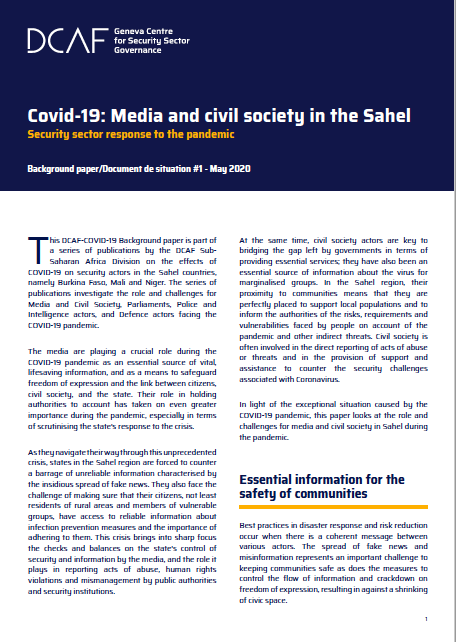|
Civil society and the media are central actors in good security sector governance, providing oversight by holding authorities and state actors to account in a credible, honest, independent and transparent way. In a society where civil society and media can work without hindrance, they help to ensure security institutions don’t overstep their constitutional or legal boundaries. This role is especially critical in health crises, where oversight of the response and service delivery can save lives. As states and societies around the globe respond to the COVID-19 pandemic, the media has a vital role in providing timely, credible, useful, fact-based news and countering rumour and conspiracy theories. The media ensures access to information that will keep populations safe. Civil society actors including academics and human rights defenders are furthermore contributing expertise to shaping the response to COVID-19 through public health, human rights, technology, gender aspects, public communications and outreach. Unfortunately, in some settings COVID-19 is being used as an excuse to weaken democratic institutions and oversight, crack down on free speech and the right to free assembly. New measures have imposed restraints on the media, impeding access to information and stifling critical reporting that might provide alternative oversight (e.g. journalists who can be prosecuted for spreading ‘false’ or ‘distorted’ information). When the media space is closed, civil society struggles to be heard by decision makers - a challenge that is exacerbated during the urgency of pandemic response. With security actors stepping into new or expanded roles in combatting the spread of the virus and the unintended consequences of quarantine, their effectiveness will depend largely on the measure to which they are trusted and respected and operate under full democratic control. In contexts where communities are affected by insecurity, a limited presence of the state, or subject to non-democratic or authoritarian regimes, civil society and media can play crucial roles in reinforcing the legitimacy of pandemic response. Across the globe we’re seeing examples of the positive role civil society and media are playing in building trust and awareness of the importance of pandemic response measures. In many parts of the Sahel, civil society actors fulfil a vital role in filling gaps left by governments to provide essential services. They help to provide information about the virus and to protect marginalised groups. Their partnerships with the private sector or public authorities is key to support local communities, where their proximity to the population places them in a better position to warn authorities about dangers and the particular needs and vulnerabilities people face because of the pandemic and other related threats. For a review on the role and responses of civil society and media in relation to the Covid-19 pandemic in Sub-Saharan Africa, please read our Background Paper here Anne Bennett, Head of Sub-Saharan Africa Division (SSAD) |

(Civil Society & Media)
|